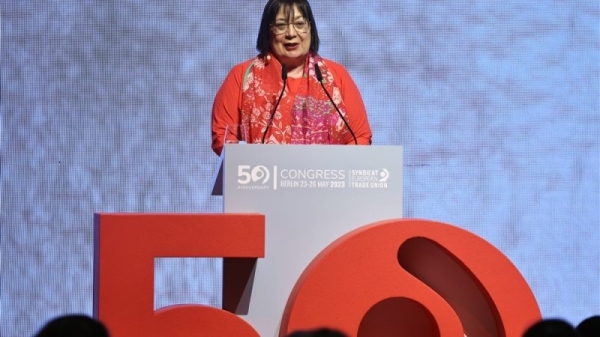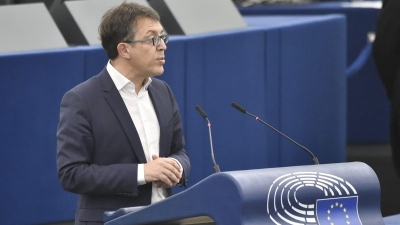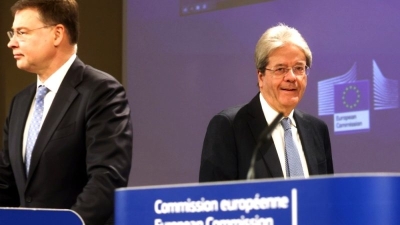Labour leaders push for faster implementation of EU Minimum Wage Directive

At the European Trade Union Confederation’s (ETUC) 50th anniversary Berlin meeting, labour leaders and EU lawmakers pushed for faster implementation of the Minimum Wage Directive and criticised the role of corporate profits in rising prices.
The 2022 directive mandates EU member states that have statutory minimum wages to introduce processes to ensure wage rates remain “adequate”, with the two-year implementation period starting in October.
More importantly for trade unions, the directive also forces member states with a collective bargaining coverage below 80% to draw up action plans to increase it, thus strengthening the position of trade unions.
ETUC General Secretary Esther Lynch invited the members of the European Parliament (MEPs) who pushed for the directive to take a “victory lap” at the conference on Wednesday (24 May).
Many who took the floor at ETUC’s Congress underlined the need for higher rates of collective bargaining across Europe, and for member nations to implement the directive as soon as possible.
“We now have the minimum wage directive that guarantees that member states do that everywhere,” Lynch said, “not just in some places, but everywhere”.
She was joined by Nicolaus Schmidt, European Commissioner for Jobs and Social Rights, who encouraged member states to implement the directive as national law prior to the two-year deadline, citing the needs of low-wage workers as the reason for his urgency.

EU minimum wage directive gets final stamp of approval
EU ministers approved the directive on adequate minimum wages on Tuesday (4 October), starting the two-year implementation process for member states. Meanwhile, trade unions argue for faster implementation due to the cost of living crisis.
“Some countries […] discourage collective bargaining,” Schmidt said, “and this is not part of the social contract of Europe”.
The social-democratic MEP Agnes Jongerius, meanwhile, disparaged European multinational corporations for engaging in union-busting, a practice that the minimum wage directive means to address in part.
Moreover, she said that many companies which had complained about raising wages in recent years were “making a shitload of profit”.
“I think it should be clear that it is profit pushing up inflation instead of wages,” she said.
Europe’s highest business lobbyist, however, begged to differ. Speaking at the same congress on Tuesday, the director general of BusinessEurope Markus J. Breyer said he did not believe that inflation was mainly caused by corporate profits.
“But I was always amongst those who say that there needs to be a fair split of productivity gains,” he said.
New research on wages and labour shortages
The most recent data from the European Central Bank and Eurostat tend to support Jongerius’ analysis. While a “shitload of profit” is hard to quantify, the numbers show that profits have indeed seen a steep rise.
Moreover, they show that the capital share of productivity gains has grown to the detriment of the labour share in the EU, meaning that an increasing part of company profits go towards benefitting capital owners instead of workers.
The data suggest that companies’ pricing power currently exceeds the power of workers, which fits a general pattern of long-term decline in trade union strength.
“If you look at labour in the long term, there’s been a decline in workers’ bargaining power over time,” Wouter Zwysen, a senior researcher at the European Trade Union Institute, told EURACTIV.
“Generally that leads to more inequality and people with somewhat less-desirable profiles having lower wages,” he said.
However, trade unions hope that this may be about to change as the EU’s minimum wage directive strengthens their position.
Moreover, a relatively fast economic recovery and record-low unemployment have led to a labour shortage in the market. “What these sort of tight labour markets tend to do is increase the bargaining power a bit,” Zwysen said.
[Edited by János Allenbach-Ammann/Nathalie Weatherald]
Read more with EURACTIV




